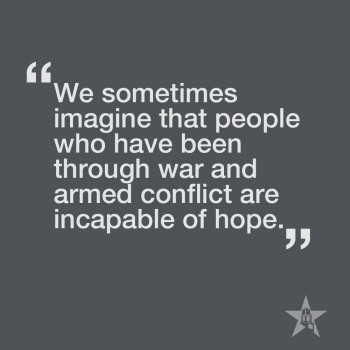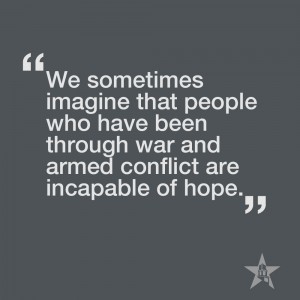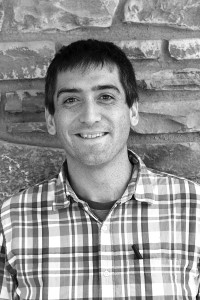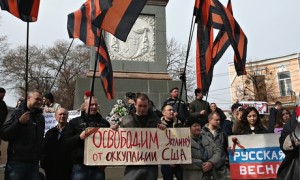By Grace Vuolo
Last week, on February 1, Houghton University had the privilege of hosting the Lviv National Philharmonic Orchestra of Ukraine in our very own Wesley Chapel, conducted by our very own conductor, Theodore Kuchar. President Lewis opened the concert, praying that it would be a blessing to all performers and visitors. His prayer was most assuredly answered. This concert was a surreal experience both for musicians and nonmusicians alike. While this writer reviews from a musical background and technical perspective, regardless of the knowledge of the listeners, the effects of the musical magic enveloped the entire room. The unmatched rush of watching professional musicians tune as the lights dimmed was enough to encompass and enhance the already heightened anticipation.
The first piece performed by the orchestra was a chamber symphony for strings and a solo flutist by Yevhen Stankovych. The coordination between the soloist and the full-string ensemble was absolutely incredible. The flutist played rapid scales and arpeggios with precision and accuracy while the strings played with animation and an array of various techniques providing different sounds. The string’s layered harmonies and flutes uplifting levels of emotion conversed to express a lively story filled with intensity and intention. Kuchar conducted with clear direction and enthusiastic involvement in each and every sequence.
The second piece played was a Brahms violin concerto. The violinists’ bows moved in perfect unison on each note. Kuchar’s conducting led to clear-cut dynamic changes in every instrument, from the soothing relaxation of soft strings to the intense acceleration of bursting brass. The communication between brass and strings during the call-and-response sections sent a vapor of perfectly synced music swirling about the entire chapel. While the orchestra worked beautifully together, the true star of the Brahms concerto was the lovely and extraordinarily talented Vladyslava Luchenko. Luchenko believes that she sees “the musician’s true purpose in being a guide to a person’s most sacred, hidden unconscious…a profound healing tool, a bridge to the higher dimensions.” The skill level that she displayed was on a level that I cannot imagine many musicians reaching in their lifetime–yet, her performance was nothing less than inspiring. Her movements were swift and precise and led the orchestra beautifully. The percussionist used the timpani to drive the beat perfectly into Luchenko’s gorgeous notes and patterns. There must also be a special shout-out to Houghton’s own graduate student Melissa Kleinberger who had the amazing opportunity to perform with the orchestra and played her cello magnificently. Congratulations, Melissa!
The third piece was Dvořák’s ninth symphony in E minor which followed Kuchar expressing Ukraine’s thanks to the U.S. for the intellectual and financial help it has sent, making it possible for the Ukrainian government to function and the orchestra to come perform at Houghton. The piece was played with such passion and emotion that the gratefulness of each and every player could be felt.
To top off the performance, the orchestra played a piece of entirely Ukrainian origin, showcasing the musical roots of the orchestra. As the piece came to a conclusive end, members of the orchestra held up a Ukrainian/United States flag. The entire performance was so filled with emotion and heart. Kuchar’s pride and love for the Lviv National Philharmonic Orchestra of Ukraine was clear and passed through to the audience.
Thank you, Professor Kuchar, for sharing with us the gift of hearing your orchestra perform, and for treating us with the same love that you showed the musicians last Wednesday night. ★



 This reality makes me especially excited for this year’s Faith and Justice Symposium, with the theme “Stories of Hope.” We sometimes imagine that people who have been through war and armed conflict are incapable of hope. Places like Somalia, the Ukraine, Iraq, the Sudan (and other nations like Rwanda and Ethiopia before them) become bywords, shortcuts we use to approximate otherwise unimaginable suffering. “There can be no hope there,” we say, “unless those of us who follow Jesus bring hope to the hopeless,” and in so saying we honor not Jesus but ourselves.
This reality makes me especially excited for this year’s Faith and Justice Symposium, with the theme “Stories of Hope.” We sometimes imagine that people who have been through war and armed conflict are incapable of hope. Places like Somalia, the Ukraine, Iraq, the Sudan (and other nations like Rwanda and Ethiopia before them) become bywords, shortcuts we use to approximate otherwise unimaginable suffering. “There can be no hope there,” we say, “unless those of us who follow Jesus bring hope to the hopeless,” and in so saying we honor not Jesus but ourselves. In spite of this, Putin has still been under heavy scrutiny by Western leaders for what they believe to be suspicious political motives in Russian involvement with Ukraine. In spite of this skepticism, Ukrainian president Petro Poroshenko expressed cautious optimism about the cease-fire. In a White House press conference following the recent North Atlantic Treaty Organization (NATO) summit in Wales, President Obama spoke to the Associated Press saying he remained “hopeful but, based on past experience, also skeptical” about the strength of this ceasefire.
In spite of this, Putin has still been under heavy scrutiny by Western leaders for what they believe to be suspicious political motives in Russian involvement with Ukraine. In spite of this skepticism, Ukrainian president Petro Poroshenko expressed cautious optimism about the cease-fire. In a White House press conference following the recent North Atlantic Treaty Organization (NATO) summit in Wales, President Obama spoke to the Associated Press saying he remained “hopeful but, based on past experience, also skeptical” about the strength of this ceasefire.
